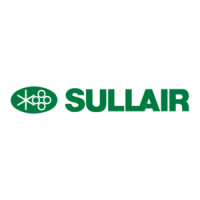14
375 Caterpillar Standard and Aftercooled/Filtered Operator’s Manual and Parts List
SECTION 2
2.5 COMPRESSOR DISCHARGE
SYSTEM, FUNCTIONAL
DESCRIPTION
Refer to Figure 2-3. The Sullair compressor unit
discharges a compressed air/uid mixture into the sump.
The sump has three functions:
It acts as a primary uid separator.1.
Serves as the compressor uid reservoir.2.
Houses the air/uid separator.3.
The compressed air/uid mixture enters the sump and is
directed against the side of the sump. Because of a
change of direction and reduction of velocity, large droplets
of uid separate and fall to the bottom of the sump. The
small amount of uid remaining in the compressed air
collects on the surface of the separator element as the
compressed air ows through the separator. As more uid
collects on the element surface, it then ows to the bottom
of the separator. A return line (or scavenge tube) leads
from the bottom of the separator element to the inlet region
of the compressor unit. Fluid collecting on the bottom of
the separator element is returned to the compressor by the
pressure difference between the area surrounding the
separator element and the compressor inlet. An orice
(protected by a strainer) is included in this return line to
assure proper and unobstructed ow. The sump is ASME
code rated at 250 psig (17.1 bar) working pressure. A
minimum pressure device located downstream from the
separator, ensures a minimum receiver pressure of 80
psig (5.5 bar) during all conditions. Keeping this pressure
level stable is necessary for proper air/uid separation and
proper uid circulation. A pressure relief valve (located on
the wet side of the separator) is set to open if the sump
pressure exceeds 250 psig (17.1 bar).
Fluid is added to the sump through a capped uid ller.
CAPACITY CONTROL SYSTEM, 2.6
FUNCTIONAL DESCRIPTION
Refer to Figure 2-4, Figure 2-5 or Figure 2-6. The purpose
of the control system is to regulate the amount of air intake
and match it to the demand (required output) on the
compressor. The control system consists of a pressure
regulating valve(s), air inlet valve, system blowdown valve,
engine speed control, and tubing connecting the various
components of the compressor and engine. The functional
descriptions of the control system are described by relating
them to four distinct phases of operation. They apply to
any control system with the exception of those with
specied pressures which are dependent on pressure
requirements. The given values apply to a compressor
with an operating pressure range of 100 to 110 psig (6.9 to
7.6 bar).
Start – 0 To 40 psig (0 To 2.8 Bar) Cold Start
When the compressor is started, the sump pressure
quickly rises from 0 to 40 psig (0 to 2.8 bar). During this
period the pressure regulator valve is inactive. At this
pressure range the idle warm-up control keeps the inlet
valve closed for engine idle operation. Within 30 seconds
of starting the compressor (the instrument panel
annunciator light goes off after 30 seconds) turn the
handle of the warm-up selector valve (located on the
instrument panel) from the START to the RUN position.
The inlet valve is fully open due to inlet pressure, and the
compressor operates at full capacity. When the
compressor operates at full capacity, the engine runs at full
speed.
WARNING
DO NOT remove caps, plugs
and/or other components when
the compressor is running or
pressurized. Stop the compressor
and relieve all internal pressure
before removing these items.

